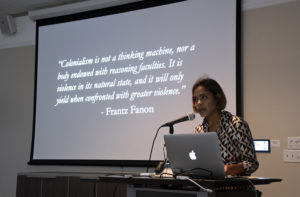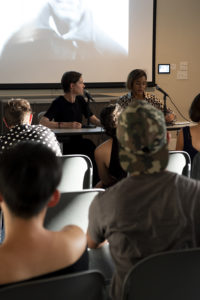Dark Humanisms, Surplus Visuality: Rizvana Bradley
Lindsey Pannor on Dark Humanisms, Surplus Visuality: Rizvana Bradley on September 12, 2019
 “Colonialism is not a thinking machine, nor a body endowed with reasoning faculties. It is violence in its natural state, and it will only yield when confronted with greater violence.”
“Colonialism is not a thinking machine, nor a body endowed with reasoning faculties. It is violence in its natural state, and it will only yield when confronted with greater violence.”
Frantz Fanon
On September 12, 2019, ARC welcomed Rizvana Bradley to the UC Berkeley campus to kick off the Fall Lecture series. Bradley has made an incredible number of achievements in her field, including her current position as an assistant professor of History of Art & African American Studies at Yale University. For the event, she spoke on a piece of recent criticism she wrote, yet to be published, concerning the dark humanisms embraced by a contemporary documentary film’s approach to archival footage of anti-colonial violence.
This film—Concerning Violence, directed by Göran Olsson—was premiered in 2014 and created of Swedish archival footage of both the Algerian Revolution and Mozambican War of Independence. Bradley argued that it is “difficult to find the violence in Concerning Violence,” and instead pointed towards the ways in which the film’s composition both violates the opacity that should be allowed to those who have been colonized and assigns the process of decolonization a female gender.
To lead her analysis, Bradley asked the question of whether or not such footage of colonial violence holds a possibly redemptive quality in its remaking, or if this doing simply reenacts the initial violence of the colonizing act. A primary consideration as to her thinking on this possibility is a text that Olsson’s film attempts to pay homage to: Frantz Fanon’s The Wretched of the Earth. This text addresses the dehumanizing effects of colonization on both the individual and national level, and outlines a model for the decolonization of both. Bradley calls Fanon’s ideals a “new humanism,” wherein its praxis is defined by care, and the embrace of the possibility of future.
 Olsson’s film does not succeed in representing Fanon’s idea of a new humanism. Instead, Bradley explained, it prioritizes the gendering of an ongoing African decolonization through three prominent figures in the film. These three figures—what was widely named “The Black Venus,” the women of FRELIMO, and the narrating voice of Lauryn Hill—are, according to Bradley, projected upon by Western philosophy in the film’s attempt to dissect them. The camera positions itself as another colonizing machine, in this sense, and the surplus visuality of an opaque subject is made obvious.
Olsson’s film does not succeed in representing Fanon’s idea of a new humanism. Instead, Bradley explained, it prioritizes the gendering of an ongoing African decolonization through three prominent figures in the film. These three figures—what was widely named “The Black Venus,” the women of FRELIMO, and the narrating voice of Lauryn Hill—are, according to Bradley, projected upon by Western philosophy in the film’s attempt to dissect them. The camera positions itself as another colonizing machine, in this sense, and the surplus visuality of an opaque subject is made obvious.
In light of this repudiation of Concerning Violence, Bradley concluded by offering an alternate vision of Fanon’s future of decolonization. She did so with the photographs of Bruno Boudjelal, describing them as “self portraits in reverse,” with a “snatched, hurried, and furtive” look that “gives shape and certain density to Algiers as a place stuck in time.” These photographs embrace the opacity of the decolonizing subject in a way that Olsson’s film does not—they are contemporary in that they represent a moment suspended between presence, and imagined future.
Lindsey Pannor is a writer and researcher based in Berkeley, CA. She holds a B.A. in English—as well as minors in Creative Writing and Journalism—from the University of California, Berkeley. She has held editorial positions for multiple publications including Zyzzyva and the Berkeley Poetry Review. She is currently ARC’s Program Assistant.
Rizvana Bradley is Assistant Professor of the History of Art and African-American Studies at Yale. She holds a BA from Williams College and a PhD from Duke University. Before coming to Yale, Bradley was as an Assistant Professor at Emory University, and a Visiting Research Fellow in the Department of the History of Art at the University College London. Born in Kenya, and raised in the U.K., Germany, Poland, Tanzania, and the U.S., Bradley’s research and teaching focus on the study of contemporary art film, and performance also at the intersections of literature, poetry, feminist and gender studies and postcolonial studies. Her scholarly approach to artistic practices in the fields of African-American cultural production, as well as the wider black diaspora expands and develops frameworks for thinking across these contexts, specifically in relation to global and transnational artistic and cinematic practices.
Bradley is currently at work on two new scholarly book projects. The first is a recipient of a Creative Capital | Andy Warhol Foundation Arts Writers Grant, and offers a critical examination of the black body across a range of experimental artistic practices that integrate film and other media. Bradley guest edited a special issue of the journal Women and Performance: A Journal of Feminist Theory, and has published articles in TDR: The Drama Review, Discourse: Journal for Theoretical Studies in Media and Culture, Rhizomes: Cultural Studies in Emerging Knowledge, Black Camera: An International Film Journal, and Film Quarterly. She was a Helena Rubinstein Critical Studies Fellow at the Whitney Museum of American Art in New York.
More information on the past event here.
